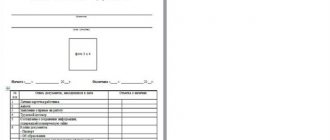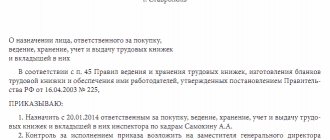Many workers in the commercial and industrial sphere bear full financial responsibility for the goods sold, since in the process of carrying out work a large number of objects for sale are lost for some reason. The employee's liability for shortage of goods is regulated by the provisions of Chapter. 29 Labor Code of the Russian Federation.
The occurrence of a shortage can be a consequence of various circumstances, but most often they are:
- incorrect execution of documents indicating a larger quantity of goods than was actually brought. In many circumstances, this is the main reason, since with a large volume of products received, the employee physically cannot keep track of the correspondence of the quantity of goods in fact and in documents;
- theft of goods by the employee himself or by other persons whom the employee was supposed to monitor, for example, store clerks;
- natural loss of goods - drying out, reduction in size and weight, as well as other circumstances on which the activities of an employee of the organization do not depend.
It is recommended to conclude not only an employment contract with an employee who will be responsible for any material assets, but also an agreement on full financial responsibility for loss of goods. This measure will avoid litigation, since in the absence of such an agreement, funds can only be recovered through the court.
Full financial liability of an employee also arises in the following cases:
- he committed an offense or crime as a result of which the employer suffered losses;
- intentionally causing damage to the employer's property;
- the employee being at the workplace in a state of alcoholic or drug intoxication, if at the same time losses arose for any reason.
The director of the organization bears financial responsibility for the damage caused to investors and founders even if there is no actual fault of his, but during the exercise of his powers the company was ruined or lost a significant part of its funds.
Identifying shortages
According to the norms of labor legislation, as well as other acts directly or indirectly related to the economic relations of employees and employers, a shortage is understood as a shortage of inventory items recorded through an audit or during an inventory.
Organizations that provide any items or products are required to conduct an audit of goods to confirm the compliance of accounting documents and the actual availability of material assets. The specifics of the audit are regulated by the local regulations of the enterprise, which establish the timing of the inventory, the procedure for its implementation, as well as the procedure for action when a shortage of goods is detected.
The employer sets the maximum possible quantity of goods that could be lost as a result of natural loss or a slight discrepancy in the counting of small items. If the audit revealed a small shortage, which is within the normal range, this means that for financially responsible employees it was actually not detected.
Federal legislation establishes cases of mandatory audits in accordance with the norms of Federal Law No. 402-FZ of December 6, 2011. This regulatory act regulates the provisions on accounting, as well as the specifics of reporting when conducting audit actions and detecting shortages. The information obtained must be recorded in the reporting period during which the inventory was carried out.
Regulatory consolidation
Types of consequences
Labor legislation of the Russian Federation provides for 2 types of liability.
- Limited - standard. The employee compensates for damage only within certain limits. As a rule, this is the average monthly salary. The basis is Art. 119 Labor Code.
- Full means compensation for damage in full, regardless of salary. This occurs only in special cases, which are indicated by Art. 121 of the Labor Code: material damage is a consequence of the criminal actions of the employee, as established by the court;
- if such responsibility is implied by the employment contract under Art. 121. Usually, the case concerns valuables transferred for storage that were lost as a result of careless saving;
- if damage to property was caused not during the performance of official duties, then it will have to be compensated in full;
- if the property was received by the employee on account in accordance with any documents;
- if the damage is caused by deliberate damage to equipment, raw materials, tools, measuring equipment, as well as due to shortages, it must be compensated in full;
- Alcohol intoxication is a serious aggravation. An employee who causes damage while intoxicated falls under Art. 121 and completely compensates for the damage.
Legislation
In accordance with paragraph 3 of Art. 121 not all workers can enter into an agreement on full financial responsibility. This is only possible with those employees who are involved in the storage, transportation, sale and processing of valuables. The list of such positions contains the Labor Code.
Financial liability is also regulated by other regulations.
- Part 1 art. 244 of the Labor Code indicates that the employee who entered into the contract is responsible only for the property that was entrusted to him. For example, salespeople in a store are responsible for the integrity of goods, cashiers are responsible for the proceeds at the register, and a storekeeper is responsible for the contents of the warehouse. Accordingly, the seller cannot be held liable for goods remaining in the warehouse, and the cashier is not responsible for storing items on the sales floor.
- In accordance with paragraph 2 of Art. 243 of the Labor Code of the Russian Federation, responsibility is assigned only for the shortage, and not for its damage. Sometimes hirers try to provide for this issue and include in the employment contract a mention of liability for damage. However, this requirement is illegal and the court exempts the employee from the need to compensate for the damage in full.
- According to No. 402-FZ “On Accounting” dated December 16, 2011, collection can be made only after an inventory has been taken. Otherwise the requirement is illegal.
- Art. 238 of the Labor Code indicates that the employee is obliged to compensate only for actual material damage. Moral damage and lost profits are not grounds for recovery. The said damage is assessed at market prices in the area, but cannot be less than the price of the item or equipment according to accounting information. Moreover, it is also necessary to take into account the degree of wear.
- According to Art. 21 of the Labor Code, an employee who discovers a shortage or damage must report this to the manager immediately. You should also be notified of potential threats to the safety of property. If after such notifications the manager does not react and the damage remains either unregistered. or is not warned, this circumstance serves as an excuse for the employee, and the damage is considered the result of negligence on the part of the manager.
Release from liability
There are also a number of unavoidable circumstances under which a worker is released from financial liability. For example, natural disasters such as earthquakes or acts of war exclude liability.
Resolution No. 52 of the Supreme Court of the Russian Federation also provides for a certain ratio of risk and extreme necessity. Thus, if saving the tenant’s property may entail criminal liability, the employee is obliged to neglect it.
For example, if during a fire, an employee saved his colleague instead of taking out material assets, such a decision exempts him from penalties. All such situations Art. 239 of the Labor Code recognizes as circumstances excluding financial liability.
Lack of valuables is not grounds for compensation. First, the hirer must determine the degree of guilt of the employee.
- If the issue has not been studied, then such a requirement is considered illegal even when an agreement on full financial liability has been signed.
- If the worker’s guilt is proven, he may be held criminally liable under Art. 160 of the Criminal Code of the Russian Federation.
Act of shortage
If a discrepancy between the actual availability of goods and accounting data is identified, a corresponding act is drawn up, which indicates the most detailed circumstances of the detection of the discrepancy and its reasons, if any can be determined.
The legislation does not establish any specific form for recording the act of shortage of goods, so the employer independently determines how to draw up the document and in what format it should be stored in the future. After developing a deficiency report, the authorized divisions of the organization provide it to the employer for approval, after which it is assigned to the organization as a permanently used document of a single standard.
The act must indicate the following information:
- details of the entity that performs the compliance check;
- data on the actual presence of each inspection object;
- the grounds that led to the initiation of the audit;
- start date of inspection work;
- composition of the inspection commission;
- consent of the persons who will be inspected by the inspection.
In another part of the goods inventory report there should be a table indicating the entire list of material assets that will be inspected, as well as their nominal and actual quantity, cost per unit and total price. If for any reason a discrepancy is detected, the deficiency section is filled out to form the total amount that is missing.
Employee Responsibility
In accordance with the provisions of Art. 242, the employee’s financial liability means his obligation to compensate for direct damage to the employer in full. In other words, the employer cannot demand from the employee compensation for lost profits or the additional cost of the goods, taking into account the premium; he has the right to receive only actual compensation for the missing goods.
Employees of the organization who have not reached the age of majority at the time of discovery of the shortage are responsible only for:
- intentional damage to the employer's property;
- harm or damage that was caused while under the influence of alcohol or drugs;
- damage resulting from the commission of an offence;
- causing harm due to the commission of a criminal offense.
Art. 242 of the Labor Code of the Russian Federation establishes legally defined cases of a citizen’s financial liability to the employer.
Such cases include:
- cases in which the employee is held responsible for improper performance of his duties;
- identification of shortages of material assets that were assigned to the employee on the basis of the contract;
- intentional damage to the employer's property, including under the influence of alcohol and psychotropic substances;
- causing harm due to a criminal attack by an employee of the organization, as well as in the event of an administrative offense;
- disclosure of state secrets.
In accordance with the provisions of Art. 244 of the Labor Code of the Russian Federation, the employer establishes the financial liability of an employee of the organization by concluding an appropriate agreement. It must be concluded in writing, indicating the grounds and specifics of compensation for damage, as well as the method of covering the identified shortage of goods.
Loss of trust due to a shortfall
An agreement on general (team) responsibility for the safety of property does not provide grounds for imputing guilt to an individual employee if there is no specific evidence. Such an agreement is the basis for the full responsibility of the entire team. Each member is presented with independent proof of guilt and punishment for the deficiency.
(inaction) of the person who caused the damage are documented It does not matter when these acts were committed: during working or non-working hours.
Distrust in an employee is expressed if his actions, which could lead to the loss of property, were committed repeatedly, and for this he received penalties.
Order for compensation
If inconsistencies are detected, a special commission enters all factual information into the goods inventory forms, including missing items, as well as excesses. After transferring the act to the head of the organization, financially responsible employees must provide explanatory notes and other documents indicating the reasons for shortages and surpluses, as well as the circumstances of the loss of inventory items.
In accordance with the explanations received, the management of the organization makes a decision to write off the existing shortage as costs, or to appoint a financially responsible person responsible for causing damage to the enterprise for further compensation of losses.
When determining compensation obligations, the head of the organization or other authorized persons prepare a package of documents, according to which the guilty employee will be assigned punishment and the obligation to compensate for losses. If the discrepancy between the actual quantity of goods and the nominal quantity occurred due to the fault of third parties who could not be identified, then the manager issues an order to write off the damage as labor costs of production.
Agreement on full financial responsibility
In order for the company's management to be able to compensate for lost losses, it appoints financially responsible persons whose responsibilities will include ensuring the safety of commercial property and monitoring their performance. As a rule, the agreement is full mat. responsibility is signed by:
- Head of the organization;
- Company/store manager;
- Persons holding administrative positions;
- Workers whose responsibilities include interacting with commercial assets. These, for example, include sellers who keep all the proceeds of the enterprise.
This agreement is concluded exclusively with adult employees and is, as a rule, an addition to the employment contract. The main purposes of signing this document are:
- The ability of the employer in the future to legally demand compensation from the responsible person for losses caused if his guilt or the guilt of his subordinates is revealed;
- Additional responsibility of persons to their employer who have commercial assets at their disposal.
The agreement is developed and signed in two copies, the first is given to the new employee, and the second remains for safekeeping with the organization’s management. In the event that the issue of making any changes to the text of the agreement is decided, then this fact must be discussed by both parties. When concluding a collective agreement, each copy is signed by all persons indicated in it.
Other measures to return shortfalls from an employee
When determining how to compensate for shortfalls, it is important to take into account the circumstances that completely relieve the employee from financial liability.
In accordance with Art. 239 of the Labor Code of the Russian Federation, the employee does not bear financial responsibility for the shortage of goods and other objects of material value in the case of:
- occurrence of force majeure circumstances, for example, flooding, declaration of a state of emergency, causing damage during necessary defense, etc.;
- failure to fulfill the employer's obligations to protect objects of liability;
- lack of conditions for storing goods due to the employer’s negligence.
When concluding an agreement on full financial responsibility, there are no difficulties in returning the shortage, however, in the absence of such a document, the losses incurred can only be claimed through the court. The employer or his representative must provide the judicial authorities with a comprehensive package of documents, according to which the employee’s guilt in the shortage will be fully proven.
If there is an agreement, the missing funds can be recovered from the employee’s salary, but not more than the maximum possible percentage of withdrawal of funds established by law.
Preparation of documents upon dismissal for shortages
The presence and correct execution of documents is the key to a lawful unilateral decision on dismissal: it will not be challenged by the employee in court, reinstatement at work, payment of compensation for forced downtime, or an administrative fine are excluded.
The list of documents ensuring legal dismissal for shortages includes:
- Agreement on material (individual, collective) responsibility
- The act of transferring valuables to the responsible person
- Inventory report
- Report of identified shortage
- Explanatory note of the person who committed the shortage (an act certifying the refusal to provide explanations)
- Certificate of technical serviceability of devices. Required if the culprit explains the shortage by a malfunction of the instruments through which the acceptance and release of valuables was carried out (for example, scales)
- Inspection report carried out additionally after testing the devices
- Documents about previous penalties, warnings
- Order (order) to collect the last deficiency
- Order of dismissal based on: Labor Code, Article 81, paragraph 7 (loss of trust)
All documents must contain the necessary details and signatures . The employee responsible for the shortage meets them.
What should an employee do?
If a shortage is detected, the financially responsible employee has only two choices - to pay the financial responsibility assigned to him or to prove his innocence in the loss of the goods. In the first case, you need to familiarize yourself with the order that will be issued by the management of the organization and sign your acquaintance with it. After this, a certain amount of funds will be withheld from the employee’s salary to pay off the existing debt.
In the second case, everything is much more complicated, since the law defines a list of grounds that make it possible not to pay the organization’s losses. It is necessary to study in as much detail as possible the circumstances of the audit, as well as its grounds and results. Afterwards, draw up an explanatory note indicating all possible circumstances of the loss of the goods.
The employer can impose liability even if there is an explanatory note, so there is a high probability that the employee will have to go to court. At the same time, the employer can also contact the court authorities if the responsible employee refuses to reimburse the funds.
The main thing for an employee is to find evidence of his innocence, then he can not only keep his money, but also not change his place of work.
Shortages during inventory of goods are not uncommon, therefore, when carrying out work in those places where financial responsibility is determined, you need to be as scrupulous and attentive as possible. Any mistake can cost your career and money.
Basic Rules
The main points related to the procedure for dismissing employees are reflected in the Labor Code. Art. 77 of the Labor Code of the Russian Federation indicates possible grounds for termination of the contract between the employer and employee. A person may be dismissed:
- at your own request;
- at the initiative of the employer;
- by agreement of the parties;
- due to the employee’s refusal to continue working due to changed production conditions;
- when circumstances arise that require dismissal and are beyond the control of the parties.
Expert commentary
Kamensky Yuri
Lawyer
Whatever the reasons for dismissal, the procedure itself consists of basic single stages. Thus, termination of the contract occurs only after the head of the enterprise signs the relevant Order. The resigning person must read its text against signature.
When dismissing employees of certain professions, certain specific standards are followed. Order of the Ministry of Finance 119-n establishes that a person with financial responsibility is subject to dismissal after an inventory has been carried out. It should only be carried out in the presence of a financially responsible resigning person. The exception will be:
- the employee’s reluctance to attend;
- inability to participate for objective reasons. For example, a citizen is on sick leave.
Important! If an employee is absent during the inventory, it is necessary that he first signs a written consent to the transfer of the property entrusted to him without his presence.
If a citizen resigns, the inventory must be completed before the last working day. However, meeting deadlines is not always possible due to circumstances. For example, an employment contract must be terminated urgently at the request of the employee, and he himself refuses to participate in the inventory. In such a situation, the employer does not have the right to prevent dismissal, and is obliged to make a full payment and hand over the work book. Inventory is carried out after the termination of the contract.
After completing the inventory, a Transfer and Acceptance Certificate is drawn up. The document contains a list of property assets that the employee transfers to another responsible person, who will then perform the duties of the resigning employee. Both of these employees must sign the Certificate. Plus the signature is given by the head of the department and the chief accountant.








